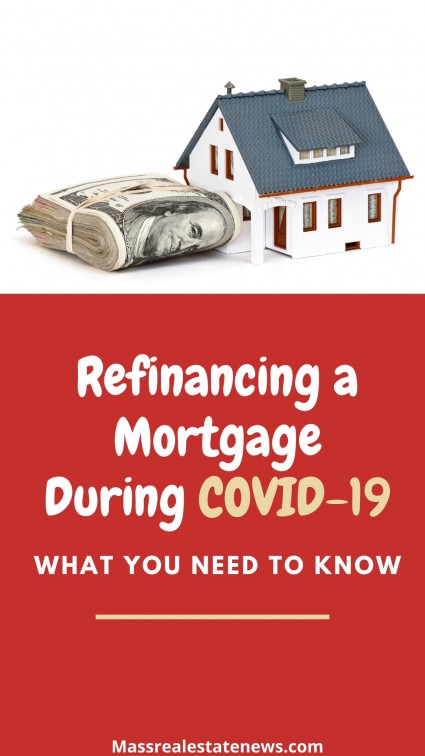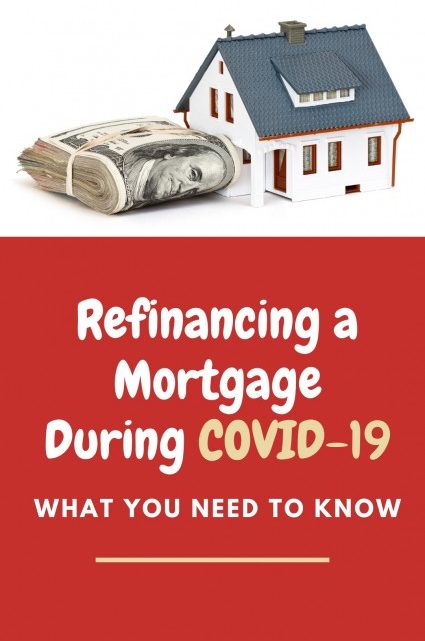What to Know About Refinancing a Mortgage
The COVID-19 pandemic has radically impacted the real estate market, but policymakers have already responded with measures to soften the blow. While buyers and sellers were initially holding back from entering the real estate market that has recently changed with markets around the country on the upswing.
One of the most effective measures they’ve taken is to set interest rates low and announce that they’re keeping them there. Rates for a 30-year fixed-rate mortgage is at nearly unprecedented lows, which would usually entice more buyers to seek out mortgages. Unfortunately, the pandemic has led many sellers to pull their listings from the market until open houses are allowed again, and many buyers are still reluctant to buy a home they haven’t seen in person. While the market is slowly recovering, the numbers are nowhere near a typical June.
But low-interest rates can have enormous benefits for homeowners, too—if they refinance their mortgage. Many have already gotten the ball rolling; the Mortgage Bankers Association reported that refinances are up 192%, year-over-year.
So should you refinance? It depends on your circumstances. We’ll cover some of the more popular refinance options below, along with the pros and cons of refinancing, as well as some alternative ways to save on your mortgage or take advantage of low-interest rates.
To Cash-Out or Not to Cash-Out
 A cash-out refinance is exactly what it sounds like; you refinance your mortgage and take the difference between your old loan and your new loan out in cash.
A cash-out refinance is exactly what it sounds like; you refinance your mortgage and take the difference between your old loan and your new loan out in cash.
Your ability to do a cash-out refinance is going to depend on a few different factors. First, you’ll need your lender’s approval; without their cooperation, your refinance can’t move forward.
Next, you’ll need to have owned your home long enough to build up some equity; that equity is essentially what you’re cashing out. If you’ve only owned your house for, say, six months, a cash-out refinance won’t make much sense for you.
Of course, you can refinance your mortgage without cashing out your equity. Many homeowners refinance just to lower their monthly mortgage payment, which can relieve financial pressure in times of stress.
Others refinance to replace an adjustable-rate mortgage with a lower, more stable fixed-rate loan, or to shorten their overall loan term. But all potential refinancers should keep in mind that there are benefits and costs to refinancing, even if you’re living in the most affordable places in America.
Pros of Refinancing
There are lots of excellent reasons to refinance a mortgage. A lower monthly payment, or a lower loan term. Let’s say your refinance chops $150 a month off your mortgage payment. That’s $1,800 a year in savings—and $18,000 of savings over a decade. That’s real money that stays in your pocket.
A refinance can also keep your mortgage payments more or less the same, while shortening the number of years you’ll be paying them. Depending on the rate you have now, you could keep your present mortgage payment, but pay off your mortgage in twenty years instead of thirty years.
Cash in your pocket. You can use the cash from a cash-out refinance on anything you want—bills, a few months of mortgage payments, a bathroom remodel. Equity looks excellent on paper, but it can’t put food on the table.
Cons of Refinancing
Refinancing isn’t free. Technically, you’re not refinancing your mortgage; you’re replacing it with an entirely new mortgage at a lower interest rate. That means you’ll have to go through closing again—and pay closing costs. Make sure you take that into account when you’re considering a refinance.
For example, let’s say that refinancing saves you $150 a month on your mortgage payment. That’s $1,800 a year in savings. But if closing costs you $5,200, that means you won’t start coming out ahead for over three years. This is a crucial consideration for homeowners who aren’t sure how long they want to stay in their home. If you aren’t going to stay in your home longer than the “break-even” point for your refinance costs, a refinance probably doesn’t make sense for you.
Your credit may take a hit. When you apply for a refinance, it triggers a “hard inquiry” on your credit history. And since you’re starting a new loan, your credit rating will decline slightly. If you make on-time payments, it’ll recover—but until then, you can expect to carry a lower rating.
How to Refinance
Today, most lenders let you apply for a refinance with an online application. Just keep in mind that, with so many homeowners trying for a refinance right now, it might take longer to gain approval.
Getting a refinance is a lot like getting a regular mortgage. To make sure you get the best refinance possible, shop around to different lenders to see what terms they’re offering. Lenders are obligated to give you a document called a loan estimate within three days of receiving your information. The loan estimate details the potential terms of your loan, the projected payments, and the closing costs. Compare loan estimates from several lenders to discover which ones are best for you.
As we covered above, applying for a refinance is going to impact your credit score, so make sure you get all your applications in during the same two-week period, so you only take the one hit.
Once you’ve chosen the loan you want, lock in the interest rate. As long as you close before the interest rate lock expires, the rate can’t be changed on you. Once you get through closing, your refinance will be complete.
Be prepared for a virtual close due to COVID-19. Lenders will handle all of the signatures through a digital platform like DocuSign. Alternatively, they’ll send a closing specialist to your house where you can arrange a closing with proper social distancing. Make sure to ask the lender and title company how they’re handling closings and what precautions they’re taking.
Need Mortgage Help—But Don’t Want to Refinance?
If you’re exploring a mortgage refinance because of financial hardship, keep in mind that you have other options. The CARES Act allows holders of federally-backed mortgages to request forbearance for up to 180 days, or six months. So if you’re experiencing temporary, pandemic-related financial difficulty, you can essentially pause your mortgage for half a year.
Keep in mind that the payments you skip during forbearance are added onto the end of your loan term, so you still end up paying them—just much later.
Investors Can Benefit from Low-Interest Rates, Too
Let’s say you’re keeping up on your mortgage just fine, but you’re looking for ways to invest in the market right now. One tried-and-true method of real estate investment that utilizes the kind of cash-out refinance we discussed above is known as the “BRRRR Method.” This stands for Buy, Rehab, Rent, Refinance, Repeat.
How’s it work? To put it very simply, an investor using this method buys an undervalued property, renovates it to boost its value, rents it out. Hence, it’s a cash-generating asset, and then refinances the property after getting a higher appraisal that reflects the improvements they’ve put in. The last ‘R’—the “repeat”—is the part when they take the cash from the refinance and use it to buy another investment property.
This is a reliable, proven strategy that can pay great dividends right now, or if you bought an investment property in the recent past. Buying a vacation rental could also be lucrative, as more investors and buyers steer away from homes in Florida and other locations that depend on tourism. You can find deals where other investors aren’t willing to go.
Putting it all together, it’s a great time to refinance or buy property (or both). Crunching the numbers will tell you how long it takes for the refinance to pay off, and shopping around for the lowest rates and closing costs will save you thousands.
Final Thoughts on Refinancing Your Mortgage
Refinancing your mortgage almost always makes sense if you can save a few bucks. Before refinancing, do the prudent thing and shop around for the best rate and terms. Doing so will end up putting additional money in your pocket. Hopefully, you have enjoyed these tips on refinancing.
Other Valuable Mass RE News Articles
Get more outstanding advice from these resources at Massachusetts Real Estate News.
- Pros and cons of flat fee MLS – have you heard about paying a flat fee instead of a commission when selling your home? See what you need to know about entry only listings including the upsides and downsides.
- Getting your improvement loan to pay off – it is always wise when making improvements to your home to know which ones offer an excellent return on investment and which ones don’t. See where you can do well with the money you’re spending on improvements.
 About the author: About the author: The above article about refinancing a mortgage during Covid-19 was written by Luke Babich. Luke is the CSO of Clever Real Estate, an online platform that connects home buyers and sellers with top-rated agents. He’s also a real estate investor in St. Louis, MO who owns over 22 units at the age of 25 with his co-founder, Ben Mizes.
About the author: About the author: The above article about refinancing a mortgage during Covid-19 was written by Luke Babich. Luke is the CSO of Clever Real Estate, an online platform that connects home buyers and sellers with top-rated agents. He’s also a real estate investor in St. Louis, MO who owns over 22 units at the age of 25 with his co-founder, Ben Mizes.












Refinancing is a great tool and apart from just getting better terms and good rates, one can also use it to scale their rental portfolio.
One can do this by doing a cash out refinance if you have some good equity already present in your property.